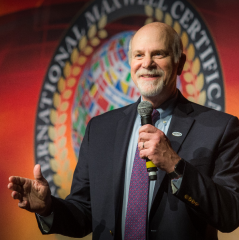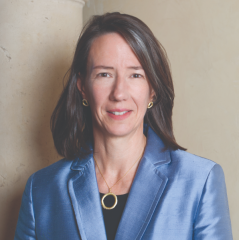In 2015, one of the longest-running hospital systems in the nation and the most innovative university in the nation came together to address the need to accelerate the health and well-being of their local community through collaborations that focus on research and discovery, educating and building a robust health care workforce and improving patient quality of life.
For Dignity Health and Arizona State University, Arizona's health is key.
“By a number of measures, the health and life expectancy of our citizens in Arizona is not where we’d like it to be,” said Dr. Keith Frey, chief physician executive at Dignity Health, clinical professor at ASU’s College of Health Solutions and senior architect of the partnership.
Traditional medical issues like premature birth, high blood pressure and diabetes affect anywhere from 10%-30% of the state’s population, while more recently recognized social determinants of health, such as poverty, food instability and access to care, make getting and staying healthy even more challenging.

Dr. Keith Frey
Those are the broader social challenges that ASU and Dignity Health are concerned about, and the ones they’re aiming their collaborative projects at, Frey said.
“ASU is a large, well-resourced university with a lot of talent that wants to make a difference in the health of our community, ” he said, “but because it doesn’t have a medical school and doesn’t provide care, having a partnership with a large, established health system like Dignity Health — which has decades of experience taking care of patients across many different socioeconomic dimensions — is a natural partnership to improve the quality of life in our community.”
Over the past four years, the ASU-Dignity Health partnership has seen 41 adjunct faculty appointments, 13 capstone projects, nine joint research seed projects and two continuing education programs. Currently in development are a graduate medical education event and a boot camp for chief residents.
“The progress we’ve been able to make and the impact we’ve had in just a handful of years is really exciting,” said Dr. Susan Pepin, managing director of health and clinical partnerships and clinical professor at ASU.
Through joint efforts like the Collaborative Strategic Initiatives Program, funding has been provided for teams of ASU researchers and Dignity clinicians to explore issues as diverse as racial disparities in low birth weight, Type 2 diabetes medical and behavioral lifestyle management and speech analysis in ALS patients with and without cognitive abnormalities.
A third round of seed funding is expected to be available in the fall.
Student capstone projects run the gamut of health issues as well. For the third year in a row, Dignity Health Medical Group (Arizona) Chief Medical Officer Dr. Bruce Bethancourt has overseen the Transitional Care Clinic. The clinic was developed to address the problem of patients at high risk of readmittance, which can result in penalties for the hospital and adverse health outcomes for patients, and to ensure that their transition from the hospital to home is successful.
“The students have been instrumental in helping us fine-tune the clinic,” Bethancourt said.

Dr. Susan Pepin
Working alongside Bethancourt and other experienced Dignity clinicians, students were able to identify factors that made patients more likely to be readmitted and recommend solutions. For example, they found that the No. 1 predictor of readmittance was a lack of transportation to get to follow-up doctor visits. Other contributing factors included cost of prescription medication and a lack of understanding of doctor’s orders for continued care.
Denise Kennedy, College of Health Solutions clinical assistant professor who provides administration leadership for student capstone projects, recalls another student project that proposed a way to streamline the traditionally slow discharge process, resulting in a faster turnaround time, enhancing patient satisfaction and generating more revenue.
“This is the kind of work that our program does,” Kennedy said. “There’s a long list of these big health improvements that might have taken forever to get to, but what we do is send in highly talented, free labor (in the form of graduate students) who have access to a professional learning environment and they send us highly seasoned experts to teach our students.”
Bethancourt and other Dignity clinicians have given lessons to ASU students on everything from how to measure physician performance to patient satisfaction to health care payment models.
“I can teach them these things, but they (the Dignity Health clinicians) live it every day,” Kennedy added. “It’s a beautiful, win-win partnership.”
The partnership is also focused on continuing education programs for current health care professionals. Kristen Will, College of Health Solutions assistant clinical professor, serves as director of executive and continuing education for the college.
“What makes our program unique is that we’ve developed programs that are interprofessional, and they really work across the whole spectrum of the health care continuum,” Will said. “We bring expertise from our college, which includes the science of health care delivery, which is the only program of its kind like that in the U.S.
“We also focus on leadership development, which is not something that’s taught in traditional training programs for health care professionals.”
Later this year, ASU and Dignity Health hope to capitalize on the success of the inaugural health care symposium they held in 2018 with a follow-up. They’re also planning a boot camp to give chief residents lessons on the nonclinical, business side of health care.
RELATED: Thunderbird, Dignity Health partner to train global health care leaders
Top photo by Nicolas Hansen/Getty Images/iStockphoto
More Health and medicine

Human-centered technology embraced at ASU Digital Health Summit
Digital health technology is advancing at lightning speed, but the innovation requires a human touch to ensure that everyone benefits from the advances, according to speakers at the inaugural ASU…

Ancient DNA could help to understand recent tuberculosis outbreak in Kansas
For over a year, Wyandotte and Johnson counties in Kansas City, Kansas, have been fighting an outbreak of tuberculosis (TB) that has claimed two lives and infected nearly 150 residents. The…

ASU researchers propose unifying model of Alzheimer’s disease
In a groundbreaking theory, scientists at Arizona State University's Biodesign Institute propose a unifying explanation for the molecular chaos driving Alzheimer's disease. The condition causes…
